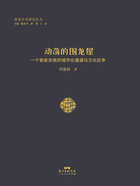
Preface
It is a pleasure and an honor to write this brief preface to Zhou Jianxin's doctoral thesis. Mr. Zhou's personal academic history, culminating in his thesis, together constitute a dramatic illustration of the enormous progress made in China over the last twenty years in the anthropological study of local society. Mr. Zhou began his career at Jiangxi Normal University, in what was then and is still one of China's best centers for the study of local society. He studied there under such excellent teachers as Xu Huailin, one of the pioneers in the field. Professor Liang Hongsheng and Professor Wang Donglin, two energetic scholars solid in academic research, also provided him with valuable guidance. Zhou's MA thesis was Imperial Examination in Jiangxi in Ming Dynasty and the Local Mores. The thesis, focused on institutional and regional history, was still bound within the traditional confines. Nevertheless, Zhou showed promise in his MA thesis. But, when compared with the present work, what was most lacking in that earlier work was the sympathetic involvement of the author in the events described:the village was an object outside the author, that did not engage his own subjectivity.
After finishing his master's thesis, Zhou Jianxin took up a position at the Hakka Studies Center of Jiaying University, where he assisted Mr. Fang Xuejia, an expert in Hakka studies, in the latter's establishment of Hakka research institute as an international centre for Hakka studies and exchange programs in this field. It was at this time that I had the pleasure of working with Zhou, who produced a number of excellent articles on villages throughout Yuedong, several of which were published in my“Traditional Hakka Society Series”. I may be wrong, but I suspect that it was during his stay in Meixian that Zhou began to develop a sense of sympathetic involvement, not just because he began to use the method of participant observation in his field work, but also and perhaps most importantly because he began to see that“traditional society”was a living society, with resources embedded in its past that could continue to serve in the present.
Then Zhou moved on to Sun Yat-sen University for his doctoral work. This was a wise choice, because Sun Yat-sen University is in the forefront of the renewal of anthropological studies in China. It is there that the important new journal History and Anthropology is produced.History and Anthroplogy is edited and published by Center for Historical Anthropology, which was co-established by the Department of History and that of Anthropology of Sun Yat-sen University and is authenticated by the Ministry of Education of China as a key research base for Humanities and other social studies. While I do not have the honor of knowing personally Zhou's advisor, Professor Zhou Daming, but I know he is one of the most original anthropologists in China. One need only look at this thesis to see what Zhou has learned since he began his studies at Sun Yat-sen University. He has learned to use some of the most current notions of contemporary anthropology in the West——symbolic capital, cultural resources, cultural resistance, cultural management, cultural nexus——to investigate some of the most critical problems of our time, in China and elsewhere:how, in a rapidly modernizing society, preserve elements of the past without turning every building into a museum? How, in a society increasingly defined by trans-local economic forces, prevent the wholesale destruction of local society and its attendant loss of identity?
What Zhou shows us in this study is that local society need not just sit passively by while its sense of self is bulldozed away together with the buildings that represent its history. It can regroup, mobilize, tap into its own traditional resources, and become an actor helping to define its own destiny. But it does this in a thoroughly modern way, by savvy use of the media, of its own international relations, and of its own symbolic capital. In the process of mobilization, local society in effect reinvents itself. By saving its past, it reclaims its present and lays claim to an active role in the construction of its future. In a word, it reinvents“civil society”, “with Chinese characteristics”.
Zhou Jianxin's work is thus a very timely illustration both of China's entry into the international dialogue and of anthropology's own renewal. Anthropology, which as an academic discipline traditionally focused on cultures without writing, has also had to reinvent itself. Zhou's work embodies two basic aspects of this reinvention:first, new conceptual tools; second, the marriage of history and anthropology, particularly appropriate for work on societies like China, with its long written history. We may say, then, that through work like that of Zhou Jianxin, we see that Chinese anthropology has come of age. It is time for the West to sit up and take notice!
John Lagerway
December 16,2005
Fontenay, France